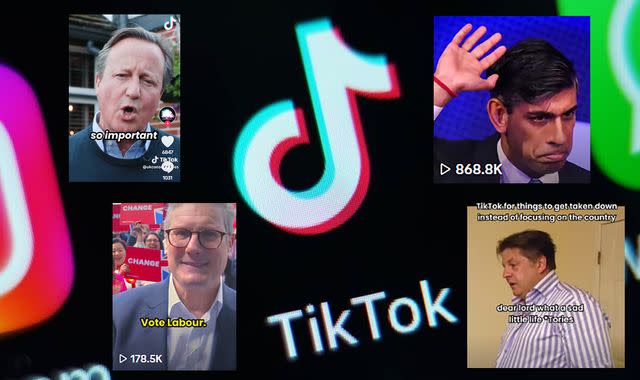Reform UK may be winning the first TikTok election

If this is the first TikTok election, you might be surprised at who's winning.
On the youngest, buzziest social media platform, Reform UK - whose vote tends somewhat towards the elderly - has the most followers, 125,500, just ahead of Labour on 108,500.
Politics live: Abbott tells rally she won't be 'intimidated'
But others are catching up fast - and how they're using it reveals a lot about a key digital battleground in this election, one of the only arenas where money doesn't buy you influence.
Because this is new territory. "It's worth noting that the three major parties are really new to the game," says Kate Dommett, professor of digital politics at the University of Sheffield.
No major party had much of a TikTok presence before the election was called. Now they're racing to build them on the fly.
Labour has found success by posting lots of videos, and using rapid reaction memes like this, which has racked up millions of likes.
Compare that to the Conservatives, who have posted only eight videos so far, most of them featuring senior party figures speaking to camera.
Or compare that to the Liberal Democrats, who only launched their TikTok account on Tuesday - they've got the same meme-heavy approach as Labour.
Why does that matter?
"I'd invest everything in organic TikTok content," says Sean Topham. "I think that's got the best opportunity to penetrate, catch fire, get the attention of people, for all the right reasons."
Mr Topham has worked with previous Conservative campaigns and his consultancy, Topham Guerin, was part of last year's victorious general election campaign in New Zealand.
"Catching fire" is important - and it's also why Reform's impressive follower count may not ultimately matter.
Read more:
The key seats to watch out for in the general election
How 'TikTok idiots' are disrupting police investigations
Call to de-select Liz Truss over appearance on 'hateful platform'
"That's never really been the measure on TikTok because your content can organically catch fire and perform really well," Topham says. "You don't need to have 125,000 followers to have 10 to 20 million views on a video.
"And that's really where the emphasis could or should be for campaigns - creating good content that overwhelms the size or immediate reach of your profile."
Mr Topham convinced the now New Zealand prime minister, in his fifties, to do "get ready with me" (GRWM) videos, but also mixed that with more serious policy videos.
"The prime minister would come up to us after a few days campaigning, saying people are coming up to me and they only recognise me from TikTok. So it just goes to show that the cut-through happens not just with younger voters as well. There's a lot of middle-aged and older demographics increasingly using TikTok to get their news and information, and they use it."
There's also another dynamic. Having seen the trouble that other platforms have gotten into, TikTok has a blanket ban on political advertising.
The millions of pounds we have already seen poured into Instagram and YouTube don't work here. So organic reach becomes key.
And, behind closed doors, both parties have tools for boosting that reach.
The Conservatives have been heavily pushing their Share 2 Win app. It makes it very easy for users to share messages from Conservative HQ to various social media platforms. Notably, TikTok is not one of them.
The more you share on your own social platforms, the more coins you earn, with a chance to jump up the leaderboard.
Labour has a slightly different emphasis. Its Labour digital campaigners group runs on WhatsApp and offers links to national and local graphics and encourages people to send in their own stories and why people may be voting Labour.
The idea is not simply to share centrally approved content, though. At a recent online seminar over Zoom, on how to master the "digital door knock", the main points were to share messages organically and through friends and family groups online, rather than repost videos of politicians.
"Keep it personal" was the title of one of the slides, whilst another gave four tips for telling a good story - one of the tips being "don't be too political".
"That sharing from your friends, from your family, can be more persuasive than just kind of saying something that's broadcast from a political party," Professor Dommett explains.
"So this is where organic comes in. It's something that pops up, you know, it's often shared by someone that we know, and therefore it's likely to resonate a little bit more."


